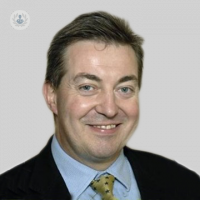Vasectomy insights: Understanding the 'Li' technique and what to expect after the procedure
Written by:Vasectomy is a highly effective method of birth control that renders a man sterile by blocking the flow of sperm through the vas deferens, the tube connecting the testicles to the penis. While it is considered the most efficient form of contraception, individuals contemplating this procedure should be aware of its irreversibility, with reversal outcomes not guaranteed. In his latest online article, Mr Gordon Muir gives us his insights.

The "Li" technique:
A minimally invasive approach performed under a short local anaesthetic, the "Li" technique, also known as the "No Scalpel Technique," involves a tiny puncture in the scrotum skin. This technique has shown minimal local side effects and typically takes around 20 minutes, with an additional brief period for preparation and rest. Most men spend no more than an hour in the clinic.
How long will I be off work for after the operation?
Patients are advised to take a few days off work and two weeks off sports and activities involving saddles. While many men may feel comfortable working and traveling the day after the operation, rest and light activity are recommended for optimal recovery.
What follow up is needed?
A sperm count is crucial at least three months post-operation, and after at least 25 ejaculations, to confirm sterility. Other contraceptive methods must be used until a negative sperm count is obtained..
Will the operation affect my sex life or orgasm?
Vasectomy has no effect on sexual function or orgasm. Some individuals may seek vasectomy hoping to improve marital or sexual issues, but the results are generally disappointing.
What complications can occur?
While complications are rare, there is a minimal chance of bruising or infection, less with the "Li" technique than standard vasectomy which involves separate stitched incisions on both sides of the scrotum. Long-term discomfort in the testicles is an uncommon complication, with uncertain causes but possibly linked to previous testicular issues.
Does vasectomy increase the risk of other diseases?
There is no evidence linking vasectomy to an increased risk of heart disease, testicular tumours, or prostate cancer. The procedure is generally considered safe in this regard.
Why is a post operative sperm count required?
The post-operative sperm count is crucial to ensure the internal part of the vas deferens is empty of sperm. While some doctors request two post-vasectomy sperm counts, the medical evidence suggests that one is usually adequate.
Is the operation failsafe?
No surgical procedure is entirely fail-safe. Early rejoining of the vas deferens can occur in less than one percent of patients. Late failure, though exceptionally rare (less than one in two thousand), emphasises the importance of periodic monitoring.
Mr Gordon Muir is an esteemed urologist. You can schedule an appointment with Mr Muir on his Top Doctors profile.


